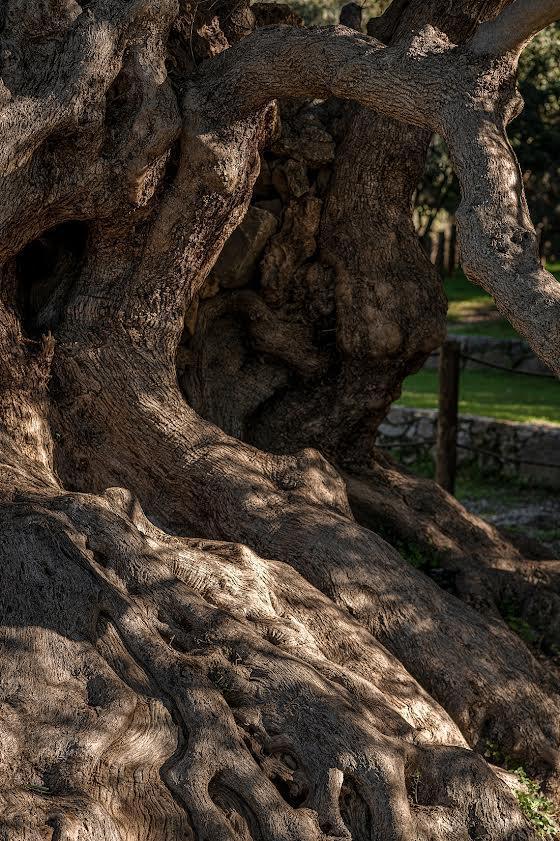Isabella Zampetaki reveals what makes olive oil a staple not only of the Mediterranean diet, but also of its lifestyle.
Isabella Zampetaki, food & travel writer, storyteller and author, shares a story about extra virgin olive oil from her book, “Handcrafted Crete”. This bilingual travel volume encompasses a multifaceted variety of age-old crafts from across the plains and mountains of Crete: from textiles, ceramics and knife-making to cheesemaking and the production of olive oil and carob food items. It travels us to wineries that produce wine in clay amphorae and to shepherds’ huts where they still make cheese as their grandparents did, in century-old copper cauldrons.
Tsunati olive trees: a living myth
The men balancing on the branches of the 12-meter-high olive tree collecting its fruit look more like birds than humans. This isn’t the easiest way to collect olives, but if they’re harvested when they’re still green – before they mature and fall to the ground – they yield a much higher quality of extra virgin oil. And this is just one of the secrets of olive farmers that Eftihis Androulakis came across and now employs to produce an olive oil that is as rich in nutrients as possible.
As with many traditional methods of production, minimum intervention in the natural process is key. The olive trees of the Tsounati variety that grow on the wild rocky slopes above the Cretan Sea do not require watering, pruning or spraying, but they are anything but low maintenance when it comes time to collect the olives. Getting to the trees means scaling the mountain, and getting to the fruit means scaling the tree. Then it’s a race against the clock to make sure that no more than five hours elapse between the harvest of the olive and the extraction of its oil. Furthermore, you need to make sure that the olives don’t get too hot, crushed during transportation or sullied by pollutants.
This explains the presence of the massive 80-kilogram batteries that are hauled up to the field every day to power the whipper wands without creating exhaust fumes. It sounds like a Sisyphean task, but it is indicative of the painstaking labor that goes into the production of high-quality olive oil – just like hand-picking the fruit, to make sure all the bad olives are cast aside.
Once the olives reach the processing facility, modern production methods take over. However, in the case of producers like Eftihis, this phase could also be described as “handmade,” given that all 20 machines used at their olive press are of their own construction.
Meet Isabella
Isabella Zampetaki is an Athens-based food & travel writer, storyteller and author. In her first book, “Handcrafted Crete”, she explores roads less traveled and delves into Crete’s cultural and culinary wealth.
She discovers everyday rituals and centuries-old traditions that remain surprisingly relevant to our modern interest in wellbeing and sustainability. With her pockets full of aromatic herbs, she experiences the essence of the Mediterranean lifestyle and inspires us to make the lives we live in this digital world happier, healthier and more meaningful.
Isabella speaks at conferences and other events about food culture, the Mediterranean diet &; lifestyle, travel, sustainability, and wellbeing in a digital world.
For more stories and podcasts by Isabella, please visit herbsinherpockets.com.
Photos courtesy of Giorgos Anastasakis / © Region of Crete



